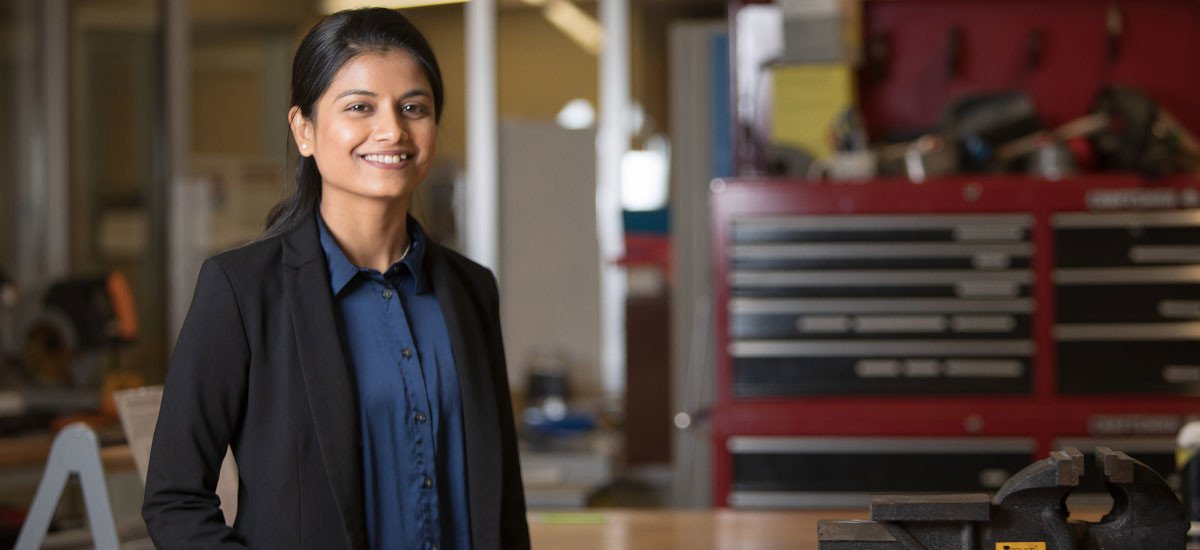Medtech Reliability Engineer Pursues MDI to Advance Career

A couple of months ago, Director of Graduate Studies for the M.S. in Medical Device Innovation (MDI) Dr. Daniel Mooradian wrote about the importance of diversity in our programs, stating how the diversity in MDI cohorts helped “provide a variety of perspectives and experiences for both the MDI program and the industries the students serve.” Much like in medtech itself, our MDI cohorts also often have students from a variety of countries, such as Meera Bavishi, who left her native India to pursue a career in a state with a rich landscape of global medtech leaders in order to make a positive impact on quality of life. She is in the 2019 MDI cohort, expected to graduate this May.
Where are you from and where did you grow up?
I grew up in India and have been in the United States for five years. I came here for the opportunity to explore the biomedical engineering field. In India, opportunities in this field are limited. I wanted to learn more and felt that the US was the right place to do so.
What was your undergraduate degree in?
I earned a B.E. in Biomedical and Instrumentation Engineering from C.U. Shah College of Engineering and Technology at Saurashtra University. I’ve been passionate about engineering since childhood and I chose this degree because it gave me an opportunity to help people by saving and enhancing their lives.
What attracted you to medtech and what do you do for work?
I was attracted to the medical device industry because I saw it as a way for me to add value to society and improve people’s lives, and I’ve been in this field for nearly 10 years. To me, nothing feels better than having the opportunity to make a difference in someone’s life, so this field gives me a lot of job satisfaction.
I was hired as a Sr. Reliability Engineer at Medtronic, a global leader in the medical device industry, with more than 500 cardiac and neurology products on the market right now. In this role, I work as a project leader for a group of contractors. Together, we work on European Union Medical Device Regulation (MDR) submissions for the post-market team. I also provide input for regulatory submissions and I participate in establishing and reviewing specifications/requirements for components, products and processes.
What led you to MDI? Why did you choose this program?
I became very interested in the M.S. in Medical Device Innovation (MDI) program when I learned there was such a degree – one designed for working individuals like myself that would offer a combination of management and innovation training. I like the experience of in-person, classroom education and having face-to-face interactions with the instructors who are active industry leaders. In general, when considering continuing education, I found that the MDI program was a great alternative for the MBA for those of us in the medical device industry.
What are you getting out of the program?
I’ve learned different tools and skills that I am confident will be useful for my career, and I hope to move into a management role by the time I finish the program. I’m also deeply inspired by my classmates and professors. They’re always pushing us to do better, and I’m surprised by how much one can learn so quickly. Steve Webster and Kirk Froggatt are two instructors who have been extremely helpful, giving me copious feedback, guidance and their time. They are genuinely interested in seeing their students’ progress.
One of the signature parts of the MDI curriculum is the capstone. Can you talk about it?
It's a work in progress but my topic is “Innovation in Pregnancy Assistive Devices to Reduce Labor Pain.” My goal is to innovate a device that can help pregnant women during labor, making it useful for both the mother and newborn.
What are some of your short-term and long-term goals?
In the short term, I am planning on working my way up to a management role at Medtronic where I can make more strategic decisions. In the long term, I want to launch my capstone product on the market!
Where do you think your industry is headed and what skills do you think will be important?
Minnesota is a major hub for the medical device industry. I like being in the center of the action with so much going on around me because I get to learn and see competition among the major companies, of which there are many in this state.
To whom would you recommend the MDI program?
MDI is one of the best investments one can make for their career in the medical device field. I would recommend the MDI program to both professionals already in the medical device industry as well as others who are simply interested in innovation and entrepreneurship.
What message do you want to send to potential MDI students?
If you are in the medical device field, never forget about the patient’s safety and wellbeing. The feeling you get from helping and saving people is truly amazing.
Students in the M.S. in Medical Device Innovation (MDI) degree program study medical technology innovation management, take medical industry-specific electives and more. Attend an information session to find out how the Master of Science in Medical Device Innovation can give you the experience you need to advance your career.